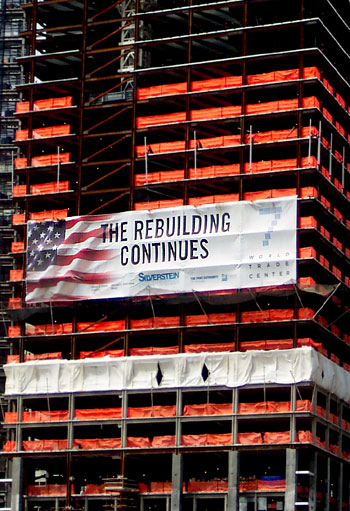|
Three Years of Rebuilding: |
How the collapse of the Twin Towers will impact the long term health of New Yorkers is probably the most open-ended question remaining three years after the attack.
Within a week of 9/11, the Environmental Protection Agency announced that lower Manhattan residents were not at risk from the dust created by the collapse of the Twin Towers. Residents and businesses were told to clean dust from their apartments and wash ash-covered clothing separately, but rescue workers at the site were the only ones facing a real health risk.
In a report (in pdf format) issued last summer, the agency acknowledged that the White House's Council on Environmental Quality had "influenced, through the collaboration process, the information that EPA communicated to the public through its early press releases when it convinced EPA to add reassuring statements and delete cautionary ones."
The agency has received widespread criticism for these reassurances, and its subsequent cleanup in lower Manhattan.
Partially in response to this criticism, the Environmental Protection Agency established a panel to examine its own performance after 9/11, and look for unmet health needs that stem from the attack. It has started meeting, and over the next two years will develop a list of non-binding recommendations for the agency.
The city introduced a health registry to track the health of those who may have been affected by the disease. It has attracted over 50,000 people, whose health will be monitored, but not offered medical care.
These efforts have been met with various levels of cynicism - especially from those who have gotten sick.
A study published earlier this year referred to the collapse of the Twin Towers as the "largest acute environmental disaster that has ever befallen New York City." Still, the extent to which the disaster will affect the health of New Yorkers remains uncertain.
""The problem we have now is we don't know the long term, lifetime, health consequences. We just don't know, " said Paul Lioy of the Environmental and Occupational Health Sciences Institute.
The major health problems that have been linked to 9/11 are respiratory diseases like asthma, with some cases proving to be chronic. Nasal and sinus problems and gastrointestinal problems have also been tied to the attack. While no link to cancer has yet been found, and studies have found little danger of people developing cancer due to exposure to dust from the towers, some rescue workers who have developed the disease since 9/11 attribute their illnesses to the attacks.
New Yorkers also continue to suffer emotionally. A significant number of people developed post-traumatic stress disorder and depression after the attacks, and one Brooklyn hospital even saw a distinct rise in heart attacks, which its researchers attributed to post 9/11 stress.
Emotional problems have been on the decline since about six months after the attack, said Dr. Spencer Eth, director of the department of psychology at St. Vincent's Catholic Medical Center. The center has seen about 50,000 patients due to 9/11.
But over the last week, with the stress of the Republican National Convention, St. Vincent's has had to expand its hours to deal with increasing numbers of patients. Many thought they had recovered emotionally from 9/11, only to have their symptoms return.
"Right now, the conditions are there for the people to have that kind of flashback. Susceptible people will," said Eth. "The weather is warm and there are all these heavily armed people patrolling the streets."
A similar spike occurred after the crash of the Staten Island Ferry last year. Eth believes that these instances indicate a sensitivity that is part of a permanent shift in the psyche of New Yorkers.
"If you talk to people in Florida who have been through hurricanes, when the wind starts blowing, they get nervous; that lasts for years and years and years. People in southern California go on alert when they sense an earthquake, when the ground trembles a little bit," he said. "I think people in New York have been sensitized in the same way."
Â





